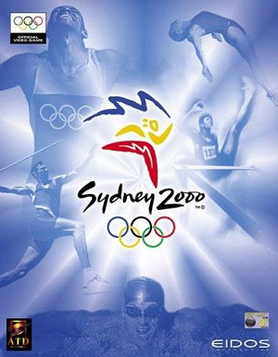
The 1980 Summer Olympics, officially known as the Games of the XXII Olympiad and commonly known as Moscow 1980, were an international multi-sport event held from 19 July to 3 August 1980 in Moscow, Soviet Union, in present-day Russia. The games were the first to be staged in an Eastern Bloc country, as well as the first Olympic Games and only Summer Olympics to be held in a Slavic language-speaking country. They were also the only Summer Olympic Games to be held in a socialist state until the 2008 Summer Olympics held in China. These were the final Olympic Games under the IOC Presidency of Michael Morris, 3rd Baron Killanin before he was succeeded by Juan Antonio Samaranch, a Spaniard, shortly afterwards.

Track and field is a sport that includes athletic contests based on running, jumping, and throwing skills. The name is derived from where the sport takes place, a running track and a grass field for the throwing and some of the jumping events. Track and field is categorized under the umbrella sport of athletics, which also includes road running, cross country running and racewalking.

Poland competed at the 2004 Summer Olympics in Athens, Greece, from 13 to 29 August 2004. This was the nation's eighteenth appearance at the Summer Olympics, except the 1984 Summer Olympics in Los Angeles, because of the Soviet boycott. The Polish Olympic Committee sent a total of 194 athletes to the Games, 132 men and 62 women, to compete in 21 sports. Men's volleyball was the only team-based sport in which Poland had its representation in these Olympic Games. There was only a single competitor in women's taekwondo.

Olympic Summer Games is an official video game of the Atlanta 1996 Olympic Games. It is the successor to Olympic Gold and Winter Olympics. It was the last "Olympic" video game released for the fourth generation of consoles, as well as the Game Boy.

Sydney 2000 is the official video game of the Games of the XXVII Olympiad, hosted by Sydney, Australia in 2000. Developed by Attention to Detail and published by Eidos Interactive, it was released for the PlayStation, Microsoft Windows and Dreamcast. There were versions developed for the Nintendo 64 and Game Boy Color, but both versions were cancelled.

The United States competed at the 1972 Summer Olympics in Munich, West Germany. 400 competitors, 316 men and 84 women, took part in 185 events in 21 sports.

The United States competed at the 1956 Summer Olympics in Melbourne, Australia. 297 competitors, 251 men and 46 women, took part in 139 events in 18 sports.

Konami '88, released as '88 Games in North America and as Hyper Sports Special in Japan, is the third in the Track & Field game series by Konami, where players test their Olympic skills against other world-class athletes. As the title implies, it is loosely based on the 1988 Summer Olympics in Seoul, South Korea.

Track & Field II, known in Japan as Konami Sports in Seoul, is a sequel to Track & Field created by Konami for the NES in 1988. It still continues the Olympic-themed sports events, but adds more realism by choosing a country for the player to represent. The series boasted 15 sporting events, with two of them available as bonus stages between rounds of the "Olympic" mode.

The UK Athletics Championships was an annual national championship in track and field for the United Kingdom, organised by the British Athletics Federation. The event incorporated the 1980 Olympic trials for the British Olympic team. The venue for the event was rotational and designed to be inclusive – all four Home Nations hosted the event during its twenty-year existence, as well as several areas of England.

Athletics was one of the seven sports of the 2011 Commonwealth Youth Games. Held between 9 and 11 September, the events were staged at the National Sports Centre in Douglas, Isle of Man.

The WAAA Championships was an annual track and field competition organised by the Women's Amateur Athletic Association (WAAA) in England. It was the foremost domestic athletics event for women during its lifetime.

The New Zealand Athletics Championships is an annual outdoor track and field competition organised by Athletics New Zealand, which serves as the national championship for the sport in New Zealand. It usually takes place over a three-day period from Friday to Sunday. Typically organised in the Southern Hemisphere summer months of February or March, the competition was inaugurated in 1887 as a men-only event, with women's events being added to the programme from 1926 onwards.

The Romanian Athletics Championships is an annual outdoor track and field competition organised by the Romanian Athletics Federation, which serves as the national championship for the sport in Romania.

The Yugoslavian Athletics Championships was an annual outdoor track and field competition organised by the Athletic Federation of Yugoslavia, which served as the national championship for the sport in Yugoslavia.

The Greek Athletics Championships is an annual outdoor track and field competition organised by the Hellenic Amateur Athletic Association, which serves as the national championship for the sport in Greece.

The Belarusian Athletics Championships is an annual outdoor track and field competition organised by the Belarusian Athletic Federation, which serves as the national championship for the sport in Belarus.

The Ethiopian Athletics Championships is an annual outdoor track and field competition organised by the Ethiopian Athletics Federation, which serves as the national championship for the sport in Ethiopia. The competition was first held in 1971. Separate annual championship events are held for cross country running, road running and racewalking events.

The Turkish Athletics Championships is an annual outdoor track and field competition organised by the Turkish Athletic Federation, which serves as the national championship for the sport in Turkey.

The Argentine Athletics Championships is an annual outdoor track and field competition organised by the Argentine Athletics Confederation, which serves as the national championship for the sport in Argentina.










